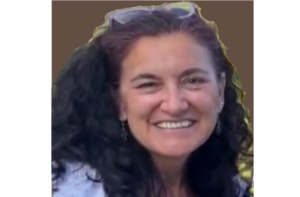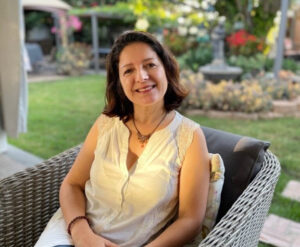By Bob Reynolds
“I believe very much in body ownership,” says Alyse Urice, a participant in LifeSpark’s Reiki program. “If you’re very connected to your own body and your own health, the chance that you’re going to get better is much improved.” Alyse was diagnosed in March 2009 with endometrial cancer. Also known as utero-ovarian cancer, it affects the entire reproductive system.
Alyse was already very aware of energy healing’s effectiveness. She has been a breath practitioner for about 17 years. She has also done “breath work” and visualization to help people with cancer. So when she needed a complementary treatment for her own cancer, Reiki seemed like a natural choice for her.
She received Reiki for six months. “I really enjoyed the practitioner I worked with,” she recalls. “Jackie was very positive.” Alyse had contracted an infection from a surgical incision. It was very slow healing; it didn’t want to go away, no matter what she did.
“The idea of pumping more drugs into my body wasn’t something I ever embraced,” she said. “I was feeling depressed about dealing with the incision and the infection. It was dragging on. Jackie was there not only to practice Reiki, but to hear the frustrations I had with other issues around treatment and healing.”
“Jackie provided a very friendly, peaceful atmosphere,” Alyse continued. “Often it was her own evenness that brought me through that session. I not only felt physically better, but I was able to integrate my breath with her Reiki, and could really feel some core healing deeper in my body. But there was also the interaction with someone who agreed that I was going to heal, and was willing to be in that same place with me.”
“One of the things that regular medicine misses—badly—is how physical and mental health affect each other. If I’m dragging through a terrible moment of physical health it’s going to affect me mentally.
When you go to a Reiki practitioner you get the feeling that they’re invested in your health, that they’re a participant in your health. You come away feeling not only better physically, but mentally as well.”
Throughout her six months of Reiki Alyse was impressed that her practitioner was addressing more than just her physical malaise. Alyse appreciated Jackie’s inner warmth, “something that went to exactly where the pain was in my body. She was very intuitive about it. There were times I felt joint aches, for example, that weren’t directly related to the cancer treatment. But Jackie would say things like, ‘I can sense that you’re having some pain here,’ in my knee or whatnot.”
“There was a mind-body-emotion connection. When you’re dealing with cancer, your mind is going a 100 miles per hour. The thing that I found helpful about Reiki was not just calming my physical issues, but also calming my spirit, bringing quietude to a place inside me.”
Alyse‘s daughter and son were teenagers at the time she was dealing with her cancer. She felt fortunate to be employed, but her children had no other family aside from her. Alyse fretted about what would happen to them if she died. “My head was constantly all about, ‘How am I going to pay the bills, what else am I going to do, and how else am I going to juggle this?’—all while I’m dealing with my body, and being in pain, and having to get back to work.
All that junk that’s fighting in your head, while you’re trying to heal your body. I would go in for a Reiki session, and I had time to be in my body, in a space that was quiet and fluid. And the only voice I heard was Jackie telling me that I was whole and OK, and that things were going to work out. … Those moments of releasing all that other junk helped expedite that healing process for me.”
Alyse’s children saw that she was tense and resentful. “There were times when I was tired, and didn’t want to drive there—you think of all these excuses,” she remembers. “But my kids would shove me out the door to go to my sessions. They’d say, ‘It’s your Reiki session. You always come back from it looking and sounding better. So just go!’”
For Alyse, the gift of cancer was that she stopped talking about what she wanted to do, and started doing it. In the years since she was diagnosed, she has “made a lot of change” in her life. She now has friends and community support that she had previously lacked, and is engaged in nonprofit work that she’d always wanted to do.
About the benefits of Reiki, Alyse says, “There are some people who’ll tell you that Reiki and Healing Touch are ‘New Age,’ that it’s a bit off the wall. But look at places like the Cleveland Clinic and the Mayo Clinic that have been doing research in cancer and complementary therapies for more than 30 years, and the success rate of those kinds of programs. And to understand that medical research and practice show that you can speak to your body and heal it.
If you’re living a life where you don’t understand that the gentle touch and healing intent of one human being on another has value, you need to learn it. You need to be willing to give it a try. Because it’s very real, and a very positive influence. It’s nothing you’ll ever regret.”
Alyse has been cancer-free now for five years.











